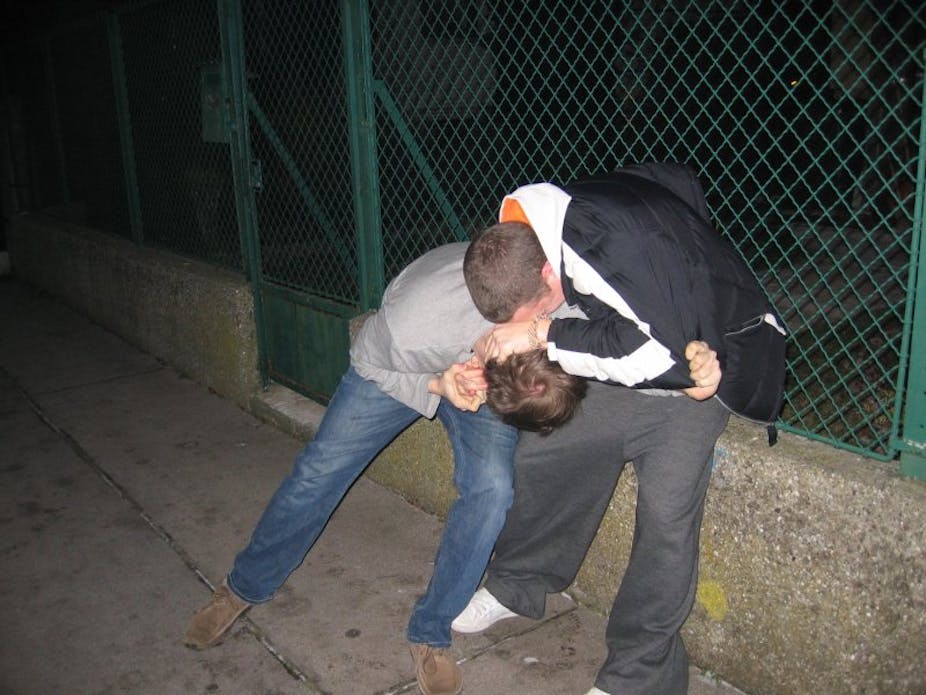Since the Thatcher years, successive governments from both political parties have been committed to reforming and reducing the public sector. Alongside, there have been numerous reforms to introduce “private sector” management systems and a market into the provision of public services.
The latest of these ideas is the “drunk tank”, a privately owned facility where drunken troublemakers could be placed overnight to sober up before being billed for their troubles.
The philosophy here is associated with Milton Friedman and the Chicago school of economists. The kernel of the argument is that consumer pressure is the only way to ensure organisations function effectively. In the UK, the focus has been on health, education and, increasingly, social care.
But the role of the private sector in the criminal justice system is often overlooked. G4S’s failures in the run-up to the London 2012 Olympics are the most high-profile example of the fact that if the private sector fails then the public purse picks up the bill.
Privately run prisons have also been the subject of much debate. There is a philosophical view that it is the role of the state to manage justice and it is not an area for profit. In terms of the management of prisons, there have been very mixed results. As Juliet Lyon, Director of the Prison Reform Trust suggested in February in response to the publication of a centre-right think tank report:
Some private prisons have proved innovative and effective, but others have been criticised by the Chief Inspector for their high staff turnover, tendency to cut corners and weaknesses in security.
From Ministry of Justice data, it is almost impossible to compare the performance and reoffending rates of one establishment with another, partly because prisons hold different categories of offenders and also because prisoners often serve their sentences in a number of different jails.
Private security contractors have also been criticised. The death of Jimmy Mubenga who was restrained by G4S staff led to a damning indictment of the company at the inquest last month.
False economy
The concerns with all these approaches is that the terms of the contract mean that the private provider must undercut the public one. This pattern of outsourcing and reducing employee wages and other benefits has been a feature of the public sector over the past 30 years across liberal democracies.
In these areas, the only way to do this is by reducing staff wages. Poor pay inevitably leads to the recruitment of staff with fewer qualifications and experience. The overall service is bound to suffer. In health, social care and penal environments the impact will be on individual lives.

There are an increasing number of civilians working for the police, but also we have an increasing role for private security firms such as G4S. The introduction of the role of the Police Community Support Officer was justified by David Blunkett, home secretary at the time, as a way of freeing up the time of more highly trained (and expensive) staff to deal with more serious matters. These developments have taken place alongside others such as Tom Winsor’s review of police pay and conditions.
More recent fly-on-the-wall documentaries such as Cops have attempted to give a more realistic picture of the nature of modern policing. However our image of the Thin Blue Line is still dominated by TV and film images. The reality is that serious and violent crime is comparatively rare. The majority of police work is not focused on the sorts of cases and crimes that dominate the media.
Policing involves dealing with an enormous range of issues, the majority of work is far removed from this glamourised world. For example the Sainsbury Centre for Mental Health estimates that 15% of police work relates to mental health issues. This point was emphasised in a recent Panorama programme which highlighted the fact that people experiencing acute mental distress were spending long periods in police custody.
Last orders
Alcohol abuse is clearly a factor in a number of social problems – particularly violent crime and assaults. New Labour’s hope that the reform of the licensing laws would lead to the creation of a continental-style café culture at the heart of our major cities has proved – perhaps not too surprisingly – to be wildly optimistic.
The policing of public drunkenness crystallises a number of issues, not only concerning the role of the police, but also wider questions about health or social care provision. As part of a campaign to highlight the problems of alcohol abuse, Adrian Lee, the chief constable of Northampton and the spokesman for the Association of Chief Constables (ACPO) has suggested that private companies should be commissioned to run “drunk tanks”.

The idea is that if someone is arrested for being drunk then they would be placed in one of these “tanks” rather than spending the night in custody. In the morning, they would be presented with a bill for their stay and a fixed penalty notice by the police. He says:
I don’t see why the police service or the health service should pick up the duty of care for someone who has chosen to go out and get so drunk that they cannot look after themselves. So why don’t we take them to a drunk cell owned by a commercial company and get the commercial company to look after them during the night until they are sober?
Lee rightly points out that the police do not have any specialist medical training to deal with these issues. Police custody suites are not equipped to provide appropriate medical care. However, the record of private providers in areas such as immigration cannot inspire confidence.
There are a number of fundamental questions that need to be asked: where will these tanks be placed? What will they look like? How will they be staffed? If the NHS is struggling to recruit qualified staff to A+E departments, then it is hard to see that a Friday night shift on the drunk tank will be an enticing prospect.
The concern is that the pattern outlined above will be followed. If this proposal is introduced it is not difficult to antipcipate a rush from a host of companies willing to bid for the no doubt lucrative contracts. However, as Anthony King and Ivor Crewe reveal in their excellent The Blunders of Our Government, governments have paid out huge sums of money on a series of private contractors with little, if any, improvement in service provision.
In this case, there is a danger that such a proposal will not just cost money; it might cost lives.

